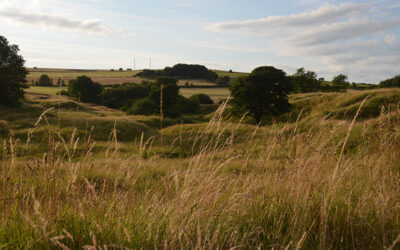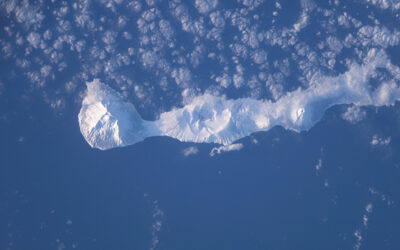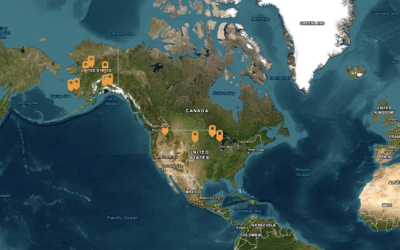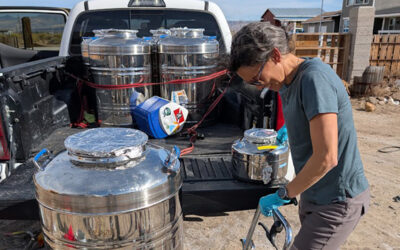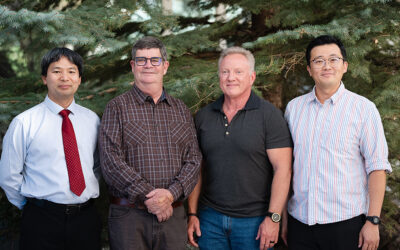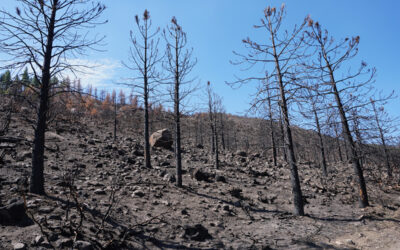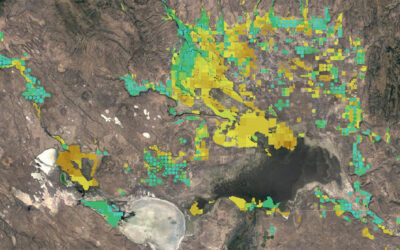News & Announcements
Working to Solve our Most Challenging Environmental Problems
DRI’s research calls on the expertise and methods of scientists from multiple scientific disciplines. More than 600 highly-skilled scientists, engineers, technicians, students, and staff work collaboratively within and across three research divisions, focused on understanding and answering critical science questions about global climate change, water quality and availability, air quality, the sustainability of desert lands, life in extreme environments, education, and more.
Lead Pollution Likely Caused Widespread IQ Declines in Ancient Rome, New Study Finds
Lead exposure is responsible for a range of human health impacts, with even relatively low levels impacting the cognitive development of children. DRI scientists have previously used atmospheric pollution records preserved in Arctic ice cores to identify periods of lead pollution throughout the Roman Empire, and now new research expands on this finding to identify how this pollution may have affected the European population.
New Research Solves 200 Year Volcanic Mystery
DRI scientists Joe McConnell and Nathan Chellman are co-authors on a new study that sheds light on a historical mystery that has plagued historians and scientists alike for nearly two centuries. Using Arctic ice core records, the team identified the volcano responsible for an enormous eruption in 1831 that caused global cooling of around 1°C, leading to crop failures and famines around the world.
Regional, Racial, and Economic Disparities in Cancer Risk from Air Pollution Exposure Persist, But Improving, New Research Suggests
Researchers from DRI and UNR teamed up for this new study, published October in Environmental Science & Technology. Using sociodemographic data from the U.S. Census Bureau and public health and air pollution information from the EPA between 2011 and 2019, the study identified higher estimated cancer risk tied to air toxics in urban communities, those with lower incomes, and those with higher proportions of racial minorities.
Native Climate Reporter Team Presents, Listens, and Learns at Indigenous Climate Conference in Alaska
Along Alaska’s western coastline, 400 miles from the nearest road system, villagers from the Indigenous community of Newtok were scheduled for permanent evacuation in mid-October due to the irreversible threat of rising seas. The story, recounted by Newtok resident Della Carl in September at the National Indigenous Climate Conference in Anchorage, Alaska, embedded itself deep in the hearts and minds of each member of the audience, making it clear not just that sea level rise is happening, but why it matters. Such is the power of a well-told story.
DRI Recruiting Fallon Community Members for Free Well Water Quality Testing
DRI scientists are recruiting fifteen Fallon residents with private wells to participate in a water quality study. All fifteen study participants will receive free water quality results, and a subset of the well owners will receive water filtration systems. The research will be used to identify the spatial extent and potential sources of contaminants such as pesticides, microplastics, and flame retardants and quantify the efficacy of treatment systems to reduce concentrations in drinking water.
Annual Awards Presented to DRI Faculty and Staff at 2024 Celebration of Science
DRI’s annual awards and recognition ceremonies were held at our Reno and Las Vegas campuses in early October to honor scientists and staff members for their achievements. Along with the below awardees, several faculty and staff were recognized for their long-term service to the institute. DRI prides itself on fostering a fulfilling workplace that builds internal community and inspires scientific discovery.
DRI’s STEM Education Program Receives DOE Grant to Support Nevada’s Clean Energy Workforce Pipeline
DRI’s STEM Education Program has received a grant from the Department of Energy’s (DOE) Office of Environmental Management to support Nevada’s clean energy workforce pipeline. The nearly $2 million in funding will be used to prepare the next generation with the knowledge and technical skills needed for employment in fields such as clean energy, waste management, and environmental remediation.
DRI Recognizes Catherine Ivanovich as the 2024 Peter B. Wagner Memorial Award Winner for Women in Atmospheric Sciences
DRI is pleased to announce that the 26th annual Peter B. Wagner Memorial Award for Women in Atmospheric Sciences has been awarded to Catherine (Casey) Ivanovich of Columbia University. The Peter B. Wagner Memorial Award for Women in Atmospheric Sciences is an annual competition recognizing the published works of women pursuing a master’s or Ph.D. in the atmospheric sciences.
Guo Yu Awarded Funding from USGS to Expand Research Examining Compounding Risks of Wildfires and Floods
Guo Yu, assistant research professor of hydrometeorology, along with collaborator Luke McGuire from the University of Arizona, received a three-year grant from the USGS Water Resources Research Act Program. The funding will be used to expand his work examining how repeated wildfires impact flooding risk in communities.
Groundwater Use Can Be Accurately Monitored With Satellites Using OpenET, New Study Finds
DRI scientists compared data from groundwater pumping meters with OpenET estimates in irrigated land to advance understanding of groundwater use. The new study demonstrated that OpenET can be used to accurately estimate the amount of groundwater used for crop irrigation at the level of individual fields.
DRI Scientists Create Guidance to Help Emergency Managers Prepare for Weather Hazards of the Future
DRI scientists partnered with the U.S. Geological Survey to produce a guidance document for incorporating publicly available data on historical and projected extreme weather events to aid with emergency planning exercises. The report, funded by the California Department of Water Resources, is available on DRI’s website.
DRI’s AWE+ Summit Tackles Wildfire Resilience and Recovery
DRI, one of our nation’s leading applied environmental research institutes, together with the DRI Foundation, this week held its inaugural AWE+ Summit -Wildfire Recovery and Resilience: Working Across Silos to Drive Solutions. The summit is a call-to-action for communities to implement measures that support resilience and human adaptability to devastating wildfire events. Nationally recognized scientific leaders discussed challenges, progress, and hope through actions that will lead to solutions.
